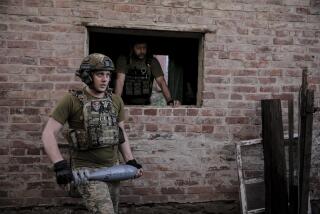COLUMN LEFT : Use Might in Service of Right : Bush has done the correct thing in the gulf. But he’s weakened by America’s inconsistency.
In the world of so-called Realpolitik, the law is the Golden Rule--that is, he who has the gold, rules. In key countries of the Middle East, the color of gold is black. The black gold referred to is oil.
It is said that Iraqi President Saddam Hussein illegally invaded Kuwait (and intended to invade Saudi Arabia) to gain control of up to 45% of the world’s oil reserves. With control of such a vital raw material, the destiny of modern industrial states would be largely in his hands. By manipulating the price and availability of oil, he could accrue great wealth and power and maintain a death grip on the world’s economic well-being.
By the same token, the United States used its economic and military might to maneuver in the world community--the U.N. Security Council, the Arab League, our NATO allies and Japan--to isolate Iraq. The big kid on the block justified his actions in the name of national security and world stability. Realpolitik’s Golden Rule seems to be operative on both sides.
Our national interest will be served and the chances for world stability enhanced to the degree that we fight for human rights measured by these yardsticks: fight for everyone’s right to self-determination; fight to strengthen and increase the rule of international law; contribute to the development of underdeveloped nations, and fight for a fairer distribution of the world’s resources, income and wealth, applying these principles consistently everywhere.
Bush’s actions to date have been prudent, skillful and in proportion. In other words, he has fundamentally been right.
In the final analysis, might may be used as a deterrent from aggression, but right must be the justification for acting. Bush is weakened by inconsistency in the application of these principles.
The moral authority of the United States was weakened when we illegally mined the harbors in Nicaragua. When the World Court found us guilty of violating international law, we ignored its verdict. By contrast, we later wanted to use the World Court’s decision against Iran in the Persian Gulf crisis. In other words, the issue was not international law and right, but might.
When we locked out the press, paid off allies in the region to “invite” us into Grenada and illegally invaded a tiny island nation of 110,000 people without a standing army--using the excuse that American students were at risk and Cubans were building an airport to be used as a Soviet military base--we were operating on the principle of might, not right.
We used the same fundamental principle in Panama, even though the situation was complicated and clouded by U.S.-financed elections that were ignored by Gen. Manuel A. Noriega. That still did not give us the right to violate the native Panamanians’ drive for self-determination. We sacrificed the lives of two dozen Americans and countless Panamanians in the process. And the Panamanians are still suffering because we have not paid them for the destruction of our invasion.
Hussein was wrong when he violated Kuwait’s right to self-determination and broke international law by invading a sovereign country. He is right, however, and gets a strong hearing in the Arab world, when he says that Israel and Syria are wrong for invading and occupying Lebanon, and that Israel is wrong for occupying the West Bank and Gaza and denying Palestinians their human rights and self-determination.
Kuwait and Saudi Arabia should not ignore the message (even though the messenger may be flawed) from many of their fellow Arabs about the grave disparity between the rich Persian Gulf states and the masses of poor in the region.
Neither should they ignore the structures of their own societies. Much of the democratic industrialized world came to their rescue with mixed emotions. They came because they needed to protect the oil for their own interests. But they were also keenly aware that they were propping up a feudal society in which the rights of the common people and women are less than others, and other freedoms (of the press, for one) are denied.
The United States should practice the democratic principles it preaches, even as it backs them up with economic and military strength. Then, when we must act, we will have the moral authority to gain the backing of the world community because we are right, and not just because we have might.
More to Read
Sign up for Essential California
The most important California stories and recommendations in your inbox every morning.
You may occasionally receive promotional content from the Los Angeles Times.










